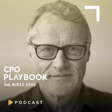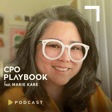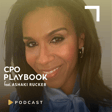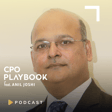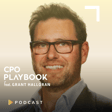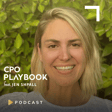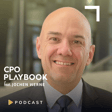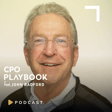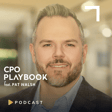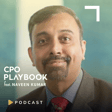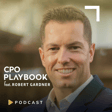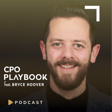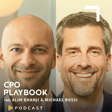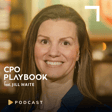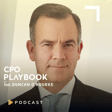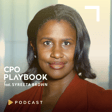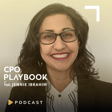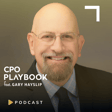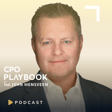Become a Creator today!Start creating today - Share your story with the world!
Start for free
00:00:00
00:00:01

Global Talent Recruiting Strategies
In this enlightening episode of CPO PLAYBOOK, we turn to James Ayres, Global Talent Acquisition Leader at Archlynk. Together, we explore the dynamic landscape of remote work and its impact on talent acquisition . James highlights how the shift to remote work has opened up a global talent pool, allowing organizations to access talent from diverse cultures. He emphasizes the necessity of aligning mindsets within recruitment teams and leadership to successfully navigate the complexities of hiring across cultures. Tune in to discover strategies for finding top talent globally, the significance of local market understanding, and how adapting recruitment processes can lead to a positive candidate experience in a remote environment!
Transcript
Introduction to CPO Playbook
00:00:01
Speaker
I'm Felicia Shakiba, and this is CPO Playbook, where we solve a business challenge in every episode.
Impact of Remote Work on Global Talent
00:00:14
Speaker
In 2024, geographical boundaries no longer confine your talent search. With remote work breaking down barriers, you have access to a global talent pool, whether it's professionals enjoying coffee in Paris or brainstorming in a Swiss chalet. Top tier talent is within reach.
00:00:33
Speaker
Yet managing hiring across numerous countries with diverse leadership and cultures can be quite complex. How do we devise a top-notch global talent acquisition strategy that addresses the nuances of various cultures, promotes talent diversity, and adapts to differing candidate experiences from one country or team to another?
00:00:56
Speaker
It's tricky.
Insights from James Ayers on Talent Acquisition
00:00:57
Speaker
Today we have a remarkable guest who will guide us through the process. James Ayers serves as the global talent acquisition leader at ArcLink with an extensive career journey that includes 12 years at Intuit and several years at Okta, plus starting off with his own recruitment company Blackstone Consultants in the early 2000s. James, welcome to the show. Well, thank you for having me.
00:01:23
Speaker
I'm excited to chat with you today. We have already had some amazing chats. This is going to be no exception. James, throughout your extensive career crafting global talent acquisition strategies across various organizations, what would you identify as the most significant challenges that you've encountered? Great question. When you think about it, the first thing that comes to mind is finding talent, but that would be a rhodius.
00:01:52
Speaker
The biggest challenge is mindset. It's not the mindset of the candidates. It's actually the mindset of the team that's helping you interview.
Aligning Recruitment Strategies Globally
00:02:02
Speaker
It's having that leadership skillset. So what are we doing here? Why are we hiring? What is it we're looking for? How do we measure it? What tools do we use?
00:02:14
Speaker
And how do we say this is a successful campaign? What KPIs do we use? All these things, you have to get alignment. And the alignment is essentially the key to having a successful runout on your recruitment. Those things, everyone's got different opinions. And so when we think about how we are going to shape it, you have to take all those ideas into consideration. So really, the biggest thing is getting aligned. That whole mindset about what we're looking at
00:02:42
Speaker
And what does awesome look like in a candidate, and how do we evaluate it? And how do you gain insights into local markets, thinking about your global experience, needing to be in multiple different countries sometimes? How do you look at those insights to really understand candidates' journeys in different parts of the world?
00:03:06
Speaker
I learned a lot in my experience by having obstacles that we think this is the path to go and we take this path and something doesn't work.
Candidate Attraction and Brand Building
00:03:16
Speaker
And so the first thing is we can't assume that what works in the United States or in Canada or Australia is all the same. Each market is unique, but the journey of the candidate and how they arrived there, it can be somewhat similar. I'll give you an example. When we think about
00:03:35
Speaker
the journey of a candidate, typically there's like five or six different points that they have to touch on to verify whether or not they want to apply for a position. It could be everything from LinkedIn to Glassdoor to Instagram to friends that work in an organization. They have to get all that feedback and understanding, do I want to apply to this company?
00:03:58
Speaker
or don't want to pass. They look at scores in the system. They'll look at the company's ratings, and then they'll make a determination if they want to pursue. I think anywhere you go in the world, people that want careers and grow, they want to find a company that's going to help them get there. And these are touch points that a lot of candidates go through no matter where you are in the world. Now, how they are attracted to a company is different.
00:04:22
Speaker
Some places, referrals are the number one thing in the world. They say, hey, come on, join us. Other cases, it's actually brand, the actual company logo.
00:04:31
Speaker
They see a company, they go, wow, what a great company. They don't know anything about it, but they recognize the brand. And so being able to create a brand that attracts tech profile in Canada that you're looking for, that is along the values of your company, where you stand for from a brand standpoint, that's a challenge. And you have to be there in the forefront and have that vision before you even start to work in all these other countries.
00:04:55
Speaker
So there's a lot of different steps. But it's almost like when we go and we want to buy a product, you see a pair of shoes in a store. And those of you that don't know what malls are, there are these ancient places still in brick and mortar that I used to go to. Now they seem to be disappearing. But let's just say for our sake, you're going through a mall and you see a pair of shoes that last really cool. Most likely, certainly back then, certainly now to a point, you'll go and verify the price in that.
00:05:22
Speaker
at other stores that would carry it if you're looking for the best price. But some people might say, I value the customer service at this organization more than the price.
Inclusive Hiring Practices
00:05:31
Speaker
It justifies why I would go to this place versus that place. It's almost like going to a restaurant. Why do you order that restaurant versus this restaurant? All these little data points are different for everyone. And it's so different when you come into recruitment and try to hire the top talent.
00:05:47
Speaker
they all have these different data points that they have to verify before they apply. I want to dig into how you ensure hiring processes and practices are inclusive. I feel like this is one of the hardest things to get because we're looking at resumes when we're recruiting, we're looking at how exciting it could be for some individual to work at the business and satisfy the need of the role.
00:06:14
Speaker
But when we're thinking about building teams, we're not just looking at the individual. We're looking at how this person comes into the team and we're looking at making sure there's little to no bias in the process. So how do you ensure the processes and practices are inclusive?
00:06:31
Speaker
When I think about looking at inclusivity and I look at things that are within the teams and recruitment, everyone has got a strong vision as to what works, doesn't work, ultimately. All these things need to be paid attention to. When I look at teams and we think about we want to have individuals from specific backgrounds, demographics, the key is everyone has to be on the same page.
00:06:58
Speaker
It's a mindset. It's not something that recruiters need to go out and find. It's something where we need to, as an organization, believe it. And when we look at inclusive teams, one of the first lessons I ever learned was when we have interview teams, they should be reflective of the organization that you are. So there should be an inclusive interview team, not just trying to find individuals that are from different backgrounds. And it's one of those aha moments.
00:07:28
Speaker
And I'll tell you that the aha moment came when we company that I used to work at, we're focused on hiring individuals from a specific background. And we were losing, we weren't doing well. And so I kind of went through like, what are we not, what's not working? And I kept on looking inward at our company and it was a questions. We were certainly attracting talent,
00:07:56
Speaker
But they weren't choosing us. I couldn't understand why we were giving money or doing all these things. And then it dawned on me. One of the lessons that I've learned is that in order to really get deep insights, you have to find out what your customer wants, what their needs are, what they're looking for. And in this case, especially with talent, your customers are either hiring managers or in a lot of cases, candidates.
00:08:24
Speaker
So we created a survey and one to find out what worked with didn't, but we did more than just a survey, like send somebody an Excel spreadsheets. They filled this out. There's no skin in the game for them. We actually did phone calls. We did video calls. So we just want to learn what we have done better. And the biggest thing that came back was as someone that came from a different background, when they came into the interview,
00:08:51
Speaker
They didn't see anybody like them. They felt isolated. They felt like they were the only one. And it made me realize we weren't doing what we said we were going to do. And that was having an inclusive organization that includes your interviewees. And we weren't doing that. And so immediately across the board, any job has to be a reflection of exactly what our company is.
00:09:15
Speaker
And that was a big aha moment. And after that, things really started to change because they saw people that they could actually emulate with and people that they felt comfortable with. That made a big difference.
00:09:27
Speaker
I wonder how far up that goes in the sense of you have to have an inclusive recruiting team or panel, let's say, for a candidate to actually meet and see people with different perspectives or similar perspectives.
00:09:45
Speaker
knowing what kind of culture they come into, right? But then in order to get that, you need inclusive leadership, right above them. And then you need an inclusive executive team. Would you say that is true, that there's the flow there that needs to happen or not so much? Yeah, you totally need it. And sometimes you have to actually have pockets of where it's thriving. You need to have that champion that believes in the cause that you're doing and to show the illustration like this makes such a massive difference.
00:10:15
Speaker
There's also a lot of cases companies think that we have to hire certain individuals and we're there. And I've learned that you're never there. You're always going to be growing. You're always going to be looking for top talent. And regardless, you have to have the buy-in from the edge.
00:10:30
Speaker
not the way to the top, it makes it a lot easier when you have it from the top, it comes down. Well, a lot of cases you have to take examples of smaller teams where an experience, because we measure candidate experience and something that I think is so vital to improvement, that when you have a positive outcome for any candidate, even if they don't get the job, that starts your social media chain of where people are talking about positive experiences.
00:11:00
Speaker
In our world, 90% of the time we tell people bad news. We make that experience so that they feel included and that they have an opportunity to apply back if they had a good experience.
00:11:13
Speaker
And that whole inclusivity has to grow within pockets and then show the difference it made, not only to the individual that we hired, but the experiences that came through. The difference it makes to the team, all the way up the chain to the point where it's like, this is just a no brainer. We shouldn't be talking about this. It should be something that naturally comes.
00:11:36
Speaker
And that's what I like to build is an environment organically, even before someone decides to apply. They know the logo, they know the company, they've seen the reviews, they go positive experiences.
Shift Towards Candidate Experience in Recruitment
00:11:49
Speaker
Yeah, this is fabulous. They take away all those fears that they will be treated well, that they'll be evaluated exactly the way everyone should be evaluated, and that everyone that they interview is an inclusive and demographically
00:12:04
Speaker
equal breakdown, big difference. I want to go back to something you said, candidate experience. What are the biggest factors that? Yeah, it's not the shirt that you wear. I mean, at the end of the day, it's a candidate experience. You know, I have to go back to, you know, I've been doing this for a few years now.
00:12:30
Speaker
And Canada experience was something that, when I first started, wasn't even in the ballpark, if I can use that term, it wasn't even on the playing field. The other day, the employer was the one that said, I've got the job. You want it? Show me what you can do. And things have changed. And when we look at things now that have come to the forefront, like Canada experience, it actually comes from the mindset
00:12:54
Speaker
of almost like a product mind shift. It's borrowed from the sense of that everyone that we meet in our world, depending on what company you work for, is potentially a customer. And if we treat our candidates like potential customers, does our mindset change in how we look at them? And really, ultimately, it shouldn't. It should be something where we treat everyone like they are people and humans and that they have an opportunity to make a difference at a company. But in the past,
00:13:23
Speaker
Years and years ago, that wasn't even on the forefront. And so now you fast forward and okay, can't experience. Why is that important? It's actually not earlier in my world. Out of all the applications that we get in, the majority of them don't get the job. And it's not because it's a lack of trying, just there's the competition is so immense. The idea is if we have the philosophy and mindset that anyone that comes to our company, first off, honored that you would choose my company.
00:13:53
Speaker
Your application process, what was that like? When you came through, did someone reach out to you within 24 hours? When you did have an interview with a candidate, how did that go? How did you feel when you moved to progress through the actual interview teams? Did you feel like you had an inclusive nature? Did you feel comfortable? All these test points are the same thing that we would do if we were buying a car.
00:14:17
Speaker
or if we were going to a restaurant, how you would shield throughout the whole process. Because if someone is going through this and they don't get the job, the one thing we can control is how they're treated. And if we do those things right, maybe they didn't come to terms on dollars. Maybe it was just another candidate. And what I found that is candidates go through a positive experience and they provide their feedback. Like I'm looking, how could we get better? If we do that, diligent,
00:14:45
Speaker
then nine out of 10 are going to come back and say, I want to go work there.
Localizing Recruitment Efforts
00:14:50
Speaker
And it's something that actually I went through myself early in my career. There was a company that I interviewed with and I didn't get the job. I was gutted. I was literally so like, Oh, so wanted. But the way they made me feel.
00:15:06
Speaker
made me realize I gotta keep my eyes on that company and I'm gonna do everything I can so that next time I do get that job and I gotta learn from all the things that maybe I wasn't so great at.
00:15:17
Speaker
And sure enough, six months later, got back in the process. And this time, nailed it. And Melanie nailed it. I want to drill down to the nitty gritty of things. How do you localize job descriptions and requirements appropriately for these various markets that are completely different from one another?
00:15:41
Speaker
I'll tell you, you learn by, so I'm Canadian military experience. I'm Canadian. So it seems like anywhere I go in the world, Canadians are known for saying, I'm sorry, which is funny. Cause I'm like, well, we didn't do anything, but we're known for saying sorry. So whenever I'm in another country and hear me say, oh, sorry, whether I'm hoping at the door or Canadian, it's one of those things that just goes with being Canadian. And the other piece is humor. I think for a lot of Canadians, we have a lot of Canadians that are in business of
00:16:09
Speaker
And so going to new markets, going with a mindset and also with a heart that wants to do the best. A lot of times when going to these markets and posting positions, you just cookie cut it. You take the job description in the United States or Canada and you get posted in the other country and they're all right, why aren't they applying? What you realize is that
00:16:34
Speaker
The way words are spelled, the way they're laid out, slang is different in every country. And I'll give you an example. I'll give you two examples. One example for one company that was based in Australia, Sydney, Australia. And we had a job description and I wanted to get a post-it. So I took the job posting, I think from Canadian jobs and just posted it. And we got into the interview process for some campus and
00:17:04
Speaker
Two of the final candidates said, hey, you know, it's been a great experience because we're asking, how is your experience? So it's great. Everyone's treating me while asking. I do have one suggestion. OK, great. Change your job description.
00:17:17
Speaker
I said, why? What's wrong? I said, you're using American English. And we want to feel as Australians that we're working for an Australian company. Cause we feel like if we work in an organization where it's just an afterthought as people, we don't know if, do you know our market? Are you valuing how we speak, how we talk, how we write?
00:17:41
Speaker
And I realized the littlest of things to me could be the biggest. That was one big aha to literally where I changed out descriptions completely and went, you know what?
00:17:52
Speaker
why don't we do video job descriptions with an Australian, where they could actually talk this thing, because I don't understand Australian sometimes, and half my family is Australian. So, you know, good on you, mate. I was like, what are you talking about? I don't even know what's going on. But it's one of those things where we celebrate the differences, but we also learn from the things that make us go, huh, didn't know that. So that was an aha moment, just in certain words, like the word color is spelled differently in Australia.
00:18:20
Speaker
certain things that are you instead of an O, they're normal. But to somebody that's in that country, when they see spelling different than what is normal in their country, they immediately go, is that a yellow flag? Or are they just not aware?
00:18:37
Speaker
It takes away from the splendor of the candidate experience because they go, I think that's a good example. I can relate to that when I'm hiring and I'm in an interview with someone or with a candidate, I can tell what kind of experiences they've had depending on the type of vernacular that they might use. And so they're tiny details that impact how great impact. Absolutely. Yeah. And the other thing, too, that's kind of neat is that even if I take it closer to home,
00:19:06
Speaker
I'm in Canada and Canada, of course, you've got mountains in the West, you've got sea of Atlantic East, and we have provinces, not States.
Data-Driven Recruitment Strategies
00:19:16
Speaker
So even now I kind of chuckle when I see some job postings that mentioned the state in Canada. It makes me go, huh? They didn't put province. So it makes you kind of think, okay, do they know the market?
00:19:28
Speaker
But it's also one of those things that like in certain places like the province of Quebec, our French hub, Canada. It's important that physicians are posted in French because it's actually along the lines of the law.
00:19:41
Speaker
And those are things that also make a huge difference to showing that you understand those particular matters that only somebody that would have done their due diligence into the province would be aware of. And that makes a huge difference, especially when you are coming outside, it just shows those individuals that, Hey, and good for them. They figured that one out. I'm going to continue this journey.
00:20:05
Speaker
I want to spring back up to a more high level question because I know that when working with various leaders and helping them hire, I'm sure you've encountered some resistors to your process or your strategy. Can you share an example of this and what was the outcome? Never. We know that. Never. For recruits taking too long to hire, it's always hiring manager's fault, right? Look, it's very common.
00:20:33
Speaker
When we think about the resistance, it's a point of view. It's coming in and saying, Hey, I got a great idea. I want to try and do this recruit. And someone's like, Oh, this is how we do it. And I I've come across a few, a lot of times it comes into systematic processes. I've never heard a hiring manager that sees a different point of view saying, Hey, I want to use these other behavioral based interview questions and competencies.
00:20:57
Speaker
If I did, I'd love that. That's always a great thing. It's typically based around skills. It's basically based around a resume or a company they've come from. And a lot of times it's because they had bad experiences once or twice. And part of it is to unwind that. Some markets we call it baggage. In other markets, it's just bad experiences that they would have had. And so to illustrate a way or a path forward, one getting back to that alignment.
00:21:25
Speaker
Every recruiter that I've worked with, including myself, at any level, one of the first things you do as a recruiter is to sit down, you have a hiring plan, an intake call, what are some of the KPIs or the ROI on this position, we get pretty deep. And part of that is so that hiring managers and recruiters are aligned, not just the skills, but what is the scope of this role and where are we going with it? Because if we're aligned as we go through a hiring plan,
00:21:55
Speaker
then we should be aligned on how we evaluate that because it's on that form. But when we're changing points of view, one of the best pieces of advice I would provide anyone is you can't just come in and say, we're doing it this way because that's the way it works. You have to illustrate through experiences. So I mentioned a little bit about candidate experience. We actually measure the candidate experience for numerous reasons, not only how they involve themselves with the company,
00:22:24
Speaker
Part of that is also to provide feedback to the interviewers. I've worked at companies before where Kansas said, Hey, I'd love to come work there, but I just didn't have a great experience. It could be everything from questions that were asked or appropriate or cameras were not turned on. If you're doing Zoom or a Teams call, you need these vital information. Essentially what you're doing is you're collecting data and you're trying to influence with data because when you have data, it's not my opinion.
00:22:52
Speaker
It's not a high man's opinion. It's the customer and the customer or the process is ultimately what is the determining factor on whether it's somebody or not. If you're selling a product, you would look at your sales figures. If it was something along the lines of performance as an athlete, did you run faster this week versus last week or this week? What did you do?
00:23:18
Speaker
By providing that data, that's how you lead.
Understanding Roles for Better Recruitment
00:23:21
Speaker
And part of that data collection, look at all the sources measured. There's 20, 30 different types of data points you can pull from that all can point in a certain direction. And so the biggest thing is when working with managers or leaders that aren't in the same mindset that we are, we have to get them there as part of what our jobs to take them on the journey.
00:23:48
Speaker
And part of that journey is, come on in, I got to drive the car. You're going to sit next to me. I'm going to show you the pathway that our candidates take and how they feel. And here's the data, whether it's on blast door or whether it's on like, Dan, maybe it's the number of hits, number of reapplications, referral, all these different things lead into.
00:24:08
Speaker
why data is so vital and how we can change mindsets using that data is vital. I love that you said and talked about data because I think both qualitative and quantitative data are equally important. And I want to jump into my last question because during our previous conversations, you hinted at your unique approach to recruiting and hiring exceptional talent, referring to it as your secret sauce.
00:24:37
Speaker
Could you share how recruiters can pinpoint precisely the right candidate to pursue? It's something I learned. It's something that I saw done and I went, what a cool idea. And it was something I went through personally.
00:24:52
Speaker
The secret sauce is this, if you're a recruiter and a lot of times if you're getting a list of demands, almost, these are the things I need to have and they need to be a purple unicorn or whatever they you're looking, it's difficult to understand. Okay. Am I looking for skills? Am I looking for competencies? I don't even quite understand the job. I'm reading the job description. I got a general idea. Maybe you've hopped on YouTube and what exactly is SQL? Do you code? Wait, what's that like Java? I'm not, I don't know how to do that. The question is this.
00:25:21
Speaker
How are you going to know the person that you need to hire unless you understand the role? Early in my career, great piece of advice had been given to me that I was struggling with a role. I think it was actually in a call center in early days. And I was working at this call center and I said, I used to know cancer, asking me like how my calls are making and
00:25:44
Speaker
what the day is like for them or the pluses, the myuses. So why don't you go hang out with the call center people? I say, really? Yeah, go sit with them, find out how they do it, watch them, study them. So, okay. I thought it was a free day. I was like, well, I don't have to go hang out with call center people. And what it gave me was such a richness of getting to the real crux of what you're hiring for.
00:26:13
Speaker
the individuals, why they chose the job. I spoke to probably 15 people on the floor of that call center that day. What do you love about the job? What don't you love about the job? What do you spend most of your time doing? Tell me the system you're working on. Do you have to actually manually put that in every single time? Do you like that part? What things do you enjoy? What things don't you enjoy? And you just study it. And as recruiters, this is like you're literally sitting in a forum watching people do what they do and you're picking up on all these things.
00:26:40
Speaker
At the time I was like, this is fascinating. Now we call them like, follow me home. Or in marketing, a lot of times it's when they give a product to a potential customer and everyone goes behind the glass window and they kind of watch people play with stuff. They go, oh, look how they do it. They're studying the behavior of how that person interacts with the product. And this is the same thing as recruiters. You cannot be expected to go and hire.
00:27:05
Speaker
a job, which all you have is a word job description and know that you found that person. So sitting with them and what I call them embedded, before you even start talking to candidates, you need to understand the environment, the people that work there, what they like, what they don't like, and you can get so much from a hiring manager.
00:27:28
Speaker
But when you're living it and breathing it, you have to walk a day in the shoes, walk a day in the shoes and you understand what the challenges are, what the successes are. And that way, when you're actually talking with candidates, you have a better understanding of what works and what doesn't. And so the candidate who really wants to have that type of career will be
00:27:49
Speaker
Hopefully impressed by that recruiter knowing so many details about a position that they will become more and more interested in the positions that go on the journey. So it's something that, you know, I don't tell our recruiters now just to do a day. I actually tell them to go for a week and just really get to know. So that's a huge one.
00:28:08
Speaker
That's great advice. And James, thank you so much for being here today and sharing your incredible insights on how to create this amazing global town acquisition strategy. Thank you so much for being here. Oh, it's been a pleasure. And thank you so much for the time. What a great platform.
Conclusion and Call to Action
00:28:29
Speaker
Thank you. That's James Ayres, global town acquisition leader at ArcLink from Canada.
00:28:39
Speaker
If today's episode captured your interest, please consider sharing it with a friend or visit cpoplaybook.com to read the episode or learn more about leadership and talent management. We greatly appreciate your rating, review and support as a subscriber. I'm Felicia Shakiba. See you next Wednesday and thanks for listening.
